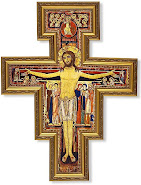The Assumption
 Last Wednesday, we celebrated The Assumption of Our Blessed Lady. Anxious as I was, I found no difficulty waking up at 6 am so that I wouldn’t miss the 7 o’clock service (Yes, I was that anxious!). Here’s a brief summary of some of the simple facts I’ve recently learned about The Assumption.
Last Wednesday, we celebrated The Assumption of Our Blessed Lady. Anxious as I was, I found no difficulty waking up at 6 am so that I wouldn’t miss the 7 o’clock service (Yes, I was that anxious!). Here’s a brief summary of some of the simple facts I’ve recently learned about The Assumption.
In the dogma, the word assumption means the taking of Our Lady, body and soul, into heaven. Some of you might even be a little surprise (just as I was) to learn that The Assumption is earlier than the belief that she was conceived immaculate. Now, I may not have a lot of books on The Assumption, or claim that The Assumption is explicitly taught in the Bible, but one thing that I think is clear to all of us, is the relationship between The Assumption and Church history. Churches have been named after the Assumption for the past millennium and a half. In fact, for 1500 years The Assumption never raised any serious questions, problem, or doubt, among Catholics. Neither Jerome, Origen, Athanasius, Ambrose, nor Augustine contested Epiphanius in what he had written regarding Mary's miraculous passing, and Ephraem described Mary as having been glorified by Christ and carried through the air to heaven [1]. You can’t ignore the beauty of Church History.
To truly understand Our Blessed Lady we must depend totally on our understanding of her Son. When we achieve that, I myself can’t help but notice that everything which flows from her, comes from her being Christ’s mother. So, as our understanding of him grows, our understanding of her grows. Understanding Christ makes it simple to recognize that Christ would want his mother with him in heaven, and not just her soul alone, but body and soul.
In heaven, she represents the human race redeemed; she alone is body and soul, where all the saved will one day be. It is a doctrine of the Church that all men would receive back the bodies from which their souls had been separate at death. That gap between was a result of sin, and Our Lady was sinless [2].
[1] Cf. Ephraem, De nativitate domini sermo 12, sermo 11, sermo 4; Opera omni syriace at latine, Vol. 2, 415
[2] Sheed, Theology for Beginners. pgs 130-131









No comments:
Post a Comment